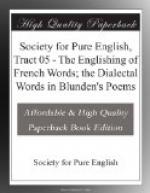The fourth question is the most perplexing: If the formerly foreign word has been taken over and if it can therefore be utilized without hesitancy, can it be made to form its plural in accord with the customs of English. Here those who seek to make the English language truly English and to keep it truly pure, will meet with sturdy resistance. It will not be easy to persuade the literate, the men of culture, to renounce the x at the end of beaux and bureaux and to spell these plurals ‘beaus’ and ‘bureaus’. And yet no one doubts that ‘beau’ and ‘bureau’ have both won the right to be regarded as having attained an honourable standing in our language.
VIII
’De Quincey once said that authors are a dangerous class for any language’—so Professor Krapp has reminded us in his book on Modern English, and he has explained that De Quincey meant ’that the literary habit of mind is likely to prove dangerous for a language ... because it so often leads a speaker or writer to distrust natural and unconscious habit, even when it is right, and to put in its stead some conscious theory of literary propriety. Such a tendency, however, is directly opposed to the true feeling for idiomatic English. It destroys the sense of security, the assurance of perfect congruity between thought and expression, which the unliterary and unacademic speaker and writer often has, and which, with both literary and unliterary, is the basis for all expressive use of language’.
And since I have borrowed the quotation from Professor Krapp I shall bring this rambling paper to an end by borrowing another, from the Toxophilus of Roger Ascham (1545).
’He that will wryte well in any tongue must folowe this council of Aristotle, to speake as the common people do, to think as wise men do. Many English writers have not done so, but using straunge wordes as latin, french, and Italian, do make all things darke and harde. Once I communed with a man whiche reasoned the englyshe tongue to be enryched and encreased thereby, sayinge—Who wyll not prayse that feaste where a man shall drinke at a diner bothe wyne, ale and beere? Truly, quod I they all be good, every one taken by hym selfe alone, but if you put Malmesye and sacke, read wine and whyte, ale and beere, and al in one pot, you shall make a drynke neyther easie to be knowen nor yet holsom for the body.’
BRANDER MATTHEWS.
NOTES
The word #laches#, which is not noticed in the above paper, is one of a list of words sent to us by a correspondent who suggests that it is the business of our society to direct the public as to their pronunciation. Like other examples given by Mr. Matthews, laches seems to be at present in an uncertain condition; and as it is used only by lawyers they will be able to decide its future. What seems clear about




